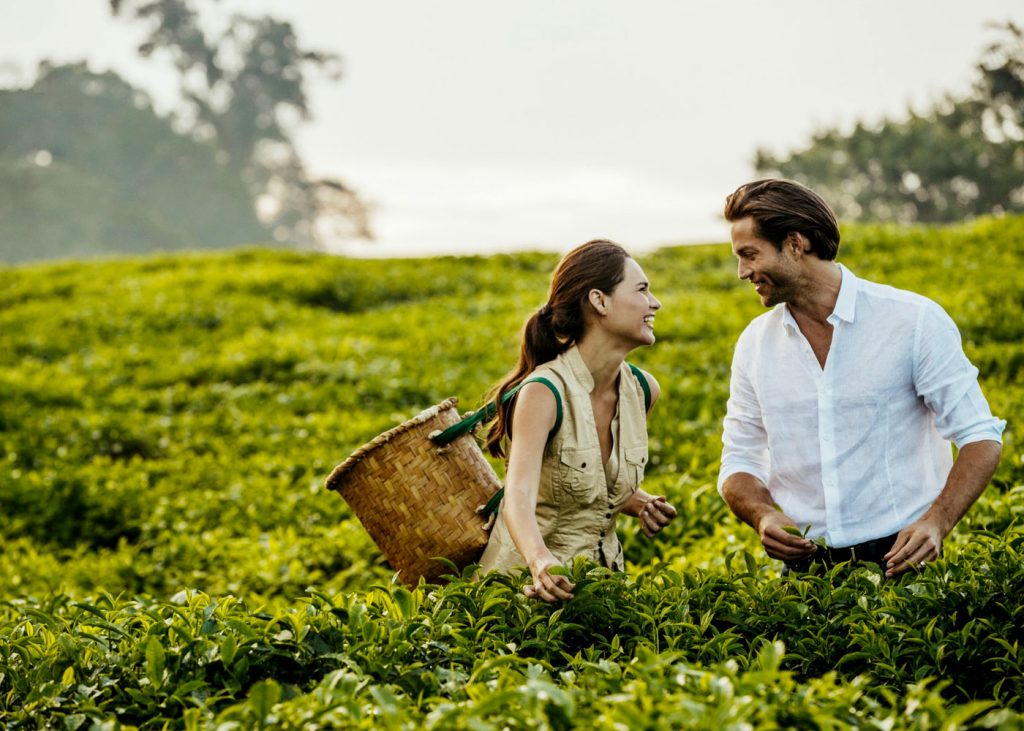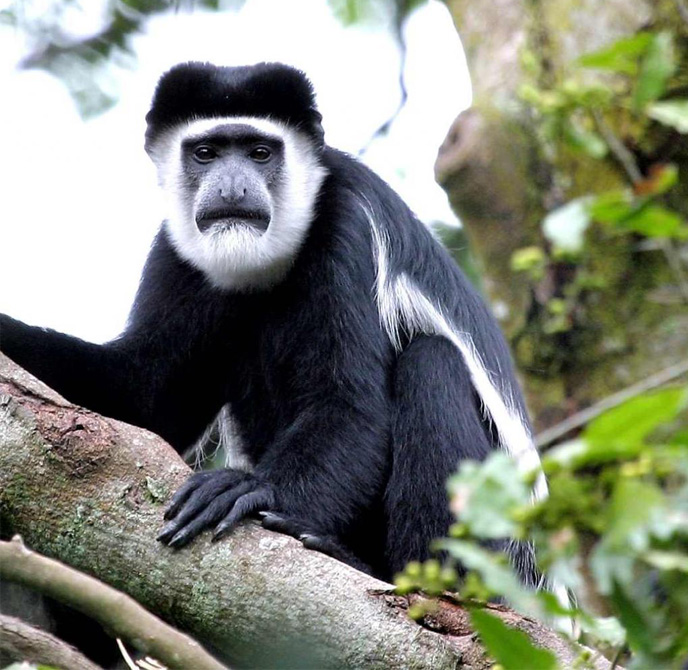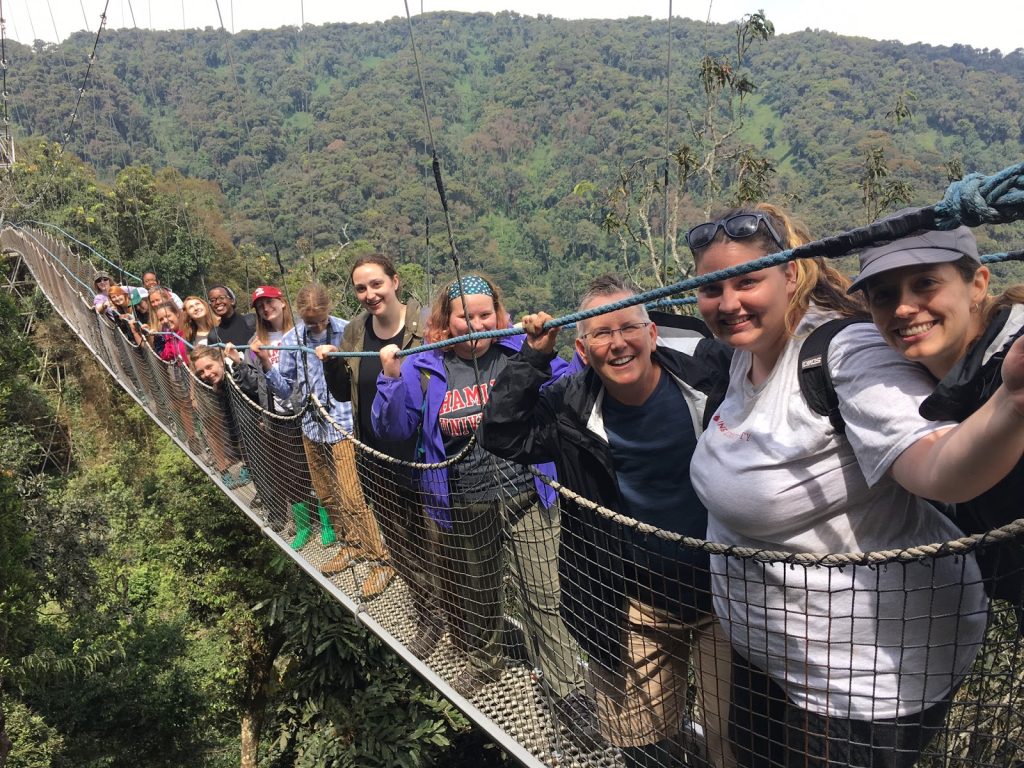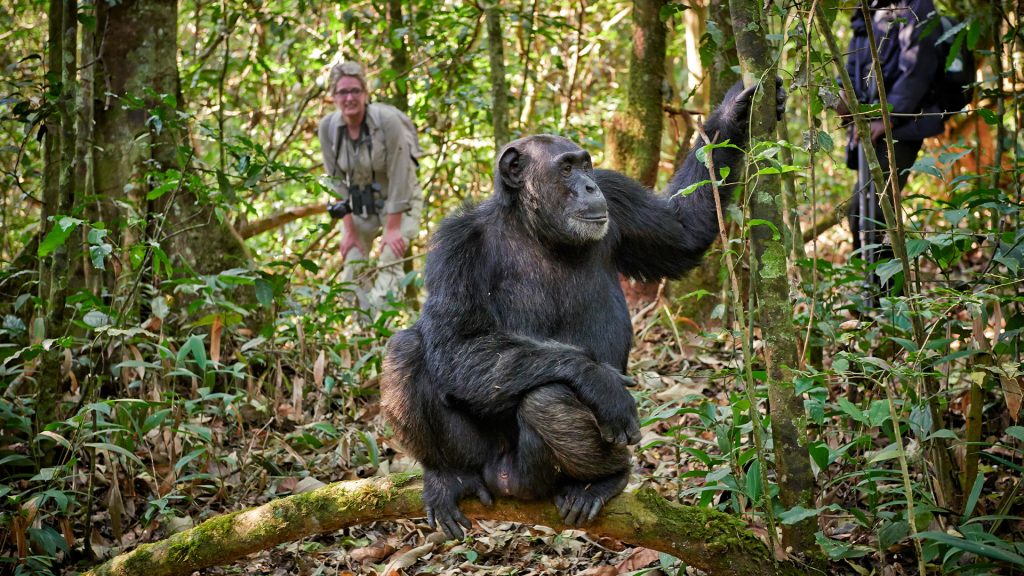Nyungwe Forest National Park Safari
- Updated: 9 months ago
- By Editorial Team
Nyungwe Forest National Park Safari – Rwanda Chimpanzee Trekking, Canopy Walk & More
Nyungwe Forest national park’s presents a cooler air, touched by mist, carried gently over ridges of deep green. You feel it even before you leave the car: that sense of something sacred just beyond the trees. A shy welcome from a forest that’s seen more seasons than anyone alive today. In Nyungwe, everything feels slower—deliberate.
Mahogany trees rise like quiet guardians. Vines twist gently down like threads from the sky. Somewhere above, a blue monkey rustles in the canopy, and a paradise flycatcher cuts through the air like a flash of white ribbon.
As you walk further, past ferns the size of small children and roots that stretch like arms across the trail, you notice something else. A scent of wild ginger. The sound of dripping leaves. And silence—not empty, but alive.
It’s the kind of silence that listens with you. You reach out and touch the bark of a tree older than any story you know. It doesn’t speak, but you feel understood. In this forest, you’re not a tourist. You’re part of something ancient, something still breathing. Something fully Rwandan.
Chimpanzee Trekking: Meeting the Forest’s Playful Royals
The chimps don’t follow a clock, and neither will you. Long before the sun touches the treetops, your guide greets you with a quiet “mwaramutse” and a warm thermos of coffee. The stars still linger. Boots crunch softly on the forest floor, and the torchlight dances across low shrubs and silver webs. The air is cool and damp, and each breath feels like it’s rinsing your soul.
Then a sound breaks the quiet—a shriek, somewhere deep in the trees. It’s high-pitched, excited, electric. “They’re awake,” your guide whispers. You move faster now, stepping over roots, ducking under low branches, following the faint trail of fresh nests and broken leaves.
Suddenly, the world comes alive. A rustle. A squeal. A baby chimp drops from one branch to another with a cheeky squeak, landing near its mother. She reaches out, calmly, and begins grooming him, as if the whole forest isn’t watching. Above, an alpha male pounds the base of a fig tree with the flat of his hand. Not a threat—just a reminder of who’s in charge. You stop. You breathe. And for a moment, you lock eyes with a creature who sees you—not with fear, but recognition. A cousin. A mirror. A moment that stitches itself into your memory forever.
Canopy Walk: Floating in a Green Sky
Some adventures make your heart race. This one asks it to slow. At Nyungwe’s famous Canopy Walk, you rise slowly—first by trail, then by courage. The suspension bridge stretches ahead of you, 70 meters above the forest floor. Narrow. Gentle. Waiting.
You step onto it, carefully. The wood creaks beneath your feet. The breeze lifts your hair. And then you look up.
The canopy surrounds you. Green upon green. Hills rolling into the distance like waves frozen in time. Beneath your feet, birds dart through branches you never knew existed. Rwenzori turacos flash red and green through the mist. Butterflies dance at your eye level.
Your breath catches, not from fear, but from wonder. This is not a rollercoaster. This is a lullaby. A floating path through a world that few people ever see from this angle. And halfway through the bridge, you stop—not to rest, but to feel. The stillness. The wind. The immensity of nature holding you in its arms.
Nyungwe Forest National Park Safari Gallery
Other Safari Activities in Nyungwe Forest National Park
Waterfall Hikes
Follow forest trails that twist and dip through quiet gullies. You’ll pass through bamboo groves and fig trees until the sound of rushing water grows louder. At the end: a waterfall, tumbling over black rock, its spray cooling your cheeks. Take off your shoes, let the water touch your feet, and feel it—pure and timeless.
Birding Walks
Nyungwe is a songbook. Over 300 bird species call this forest home, and their melodies weave through the branches. Your guide may point to an Albertine owlet or a red-collared babbler, but you don’t need to know names. Just listen. The songs will find you.
Colobus Monkey Tracking
You’ll hear them before you see them—rustling high in the bamboo. And then, there they are. A troop of colobus monkeys, their long white tails trailing like wedding veils behind them. They leap through trees with ease, playfully scolding each other. It’s like watching monks turned dancers.
Tea-Field Visits
Just outside the park, the forest softens into tea plantations. Hills roll with emerald waves. Walk between the rows. Meet the farmers. Pick a tender leaf and sip a cup so fresh it still carries the morning sun. Here, even tea has rhythm.
Whether you want a day full of discovery or just a quiet afternoon, Friendly Gorillas Safaris will tailor the moments to your pace. No rush. No checklist. Just connection.
When to Visit Nyungwe
Nyungwe doesn’t close her doors. She just changes her dress with the seasons.
June to September is the long dry season. Trails stay dry, views stretch farther, and chimpanzees are easier to track. The sun warms your back, but evenings still call for a sweater and a fireplace.
December to February brings another dry pocket—less crowded, a little greener, and full of butterflies. The light is gentle. The forest feels tender.
March to May and October to November welcome the rains. But don’t let that chase you off. The forest becomes even more alive. Waterfalls roar. Ferns unfurl. The air smells of fresh bark and earth. You might get muddy—but you’ll also find magic that dry boots will never know.
Location
Nyungwe sits tucked in Rwanda’s southwest corner, brushing shoulders with Burundi and gazing toward Lake Kivu’s glittering waters. Getting here is a journey—but a beautiful one. The road from Kigali winds through fields of maize and eucalyptus. Hills rise and fall like lullabies, and children wave from dusty roadsides with wide grins and “hello!”s. It’s about five hours by car, but you won’t count the time. You’ll count the views.
And when you finally reach the edge of the forest—when the green thickens and the light changes—you’ll know. You’ve arrived somewhere old. Somewhere kind.
History
Long before borders of Rwandan were drawn, Nyungwe was sacred. Locals called it a forest of spirits, a place where rain was born and prayers went to rest. In 1903, the German colonial government marked it as a reserve. Later, the Belgians built on that. But it wasn’t until after the 1994 Genocide against the Tutsi that Rwanda embraced Nyungwe not just as a forest—but as a national treasure.
Since then, it’s been protected, nurtured, and shared. Now it shelters thirteen primate species, rare birds, orchids, medicinal plants, and ancient wisdom. But more than that—it shelters stories. Of strength. Of community. Of how a country can rise by protecting what’s wild and beautiful.
Accommodations
Where you sleep in Nyungwe isn’t just about comfort—it’s about how you want to feel in the morning.
One&Only Nyungwe House is for those who want nature with a side of elegance. Built inside a tea plantation, it’s all timber, soft linens, and deep soaking tubs. The kind of place where the food is poetry and the mist greets you at your window.
Gisakura Guest House is simple, local, and kind. No frills. But clean rooms, hot showers, and banana pancakes that taste like someone’s grandmother made them. You’ll hear the forest from your bed. You’ll walk to the park in minutes.
Nyungwe Top View Hill Hotel sits above it all. Literally. Cottages face east or west, so you choose: sunrise or sunset. Nights are cool, stars are sharp, and the silence is absolute.
Not sure what suits you? Let Friendly Gorillas Safaris listen. They know every lodge and every view—and they’ll match your dreams with the right key.
Frequently Asked Questions
Is chimpanzee trekking difficult?
It depends. Some days the chimps are close, and the trek is a gentle stroll. Other days, they lead you deeper—up steep trails, through tangled brush. But the guides are patient. They walk at your pace. And when you find the chimps, you forget every step.
How many chimp permits are there?
Numbers are limited—fewer than 100 daily. It keeps the experience personal and the forest peaceful. If you’re coming in high season, book early, to avoid last minute quaking.
What should I wear?
Think layers because of the unpredictable weather of the forest. Long pants, long sleeves, a waterproof jacket, and solid hiking boots. Bring a hat, water, and a camera. Leave the expectations behind—Nyungwe will give you something better.
Can I combine this with gorilla trekking?
Yes, and many do. Start in Nyungwe for the chimps, then travel north to Volcanoes National Park for the gorillas. It’s a beautiful way to meet both sides of Rwanda’s wild soul.
Is the Canopy Walk safe for kids?
Yes, Nyungwe canopy walk is safe for children over six who can walk confidently. The railings are high, the bridge is well maintained, and guides are always nearby. For many families, it’s a highlight and one best experience to reconnect with your family.
Are there cultural experiences nearby?
Yes. Banda Village is a short drive away. Join a drum circle. Taste sorghum beer. Learn dances older than the hills. The people here welcome you not as a guest—but as family.
How long should I stay in Nyungwe?
To get the very best of Nyungwe, you need at least two nights. But three or four lets you settle into the rhythm. Do the treks. Take the walks. Sit quietly with tea and just listen to the forest.
Conclusion: Let the Forest Write Its Song in You
Nyungwe doesn’t need to impress. It invites. It whispers. It waits. And once you enter, you’ll find something you didn’t know was missing—until it wraps itself around your heart and stays.
Let Friendly Gorillas Safaris take you there. Let the tea steam, let the trails unfold, let the canopy sway with your breath. Because some places don’t change your plans—they change your soul. Nyungwe is one of them.










